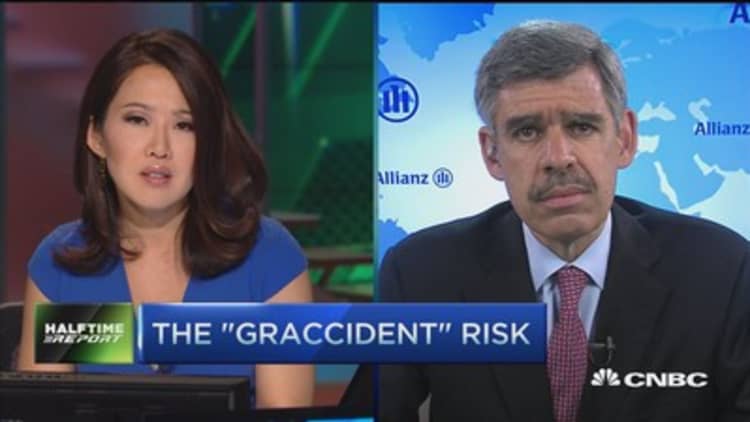
Markets underestimate the risk posed by a lack of liquidity, which looks more dangerous than Greece's precarious debt situation, Mohamed El-Erian said Monday.
Despite the high probability of an "accident" as Greece's cash-strapped government looks to unlock more aid, dissolving liquidity will fuel more market turmoil moving forward, said El-Erian, chief economic advisor at Allianz and former Pimco CEO. He noted that investors should compensate for that uncertainty.
"Liquidity is the most underappreciated risk factor out there. We've seen the bond market reprice to an understanding that liquidity is not as abundant as all that, and I would just worry about the liquidity risk," El-Erian said in a "Fast Money: Halftime Report" interview.
Notable market watchers including JPMorgan Chase CEO Jamie Dimon and former Treasury Secretary Larry Summers have also warned about liquidity in recent months.
A selloff sent the yield on the benchmark U.S. 10-year Treasury note soaring above 2.3 percent at times last week. However, it has since moved lower and was around 2.21 percent Monday.
Read MoreHow the Treasury selloff could turn 'chaotic'
Equity markets have focused on cash flow, driven by easy central bank policy in Europe and China and increasing stock buybacks, El-Erian contended. U.S. companies said they would buy back $141 billion worth of their stock in April, the most ever in a month.
With that much money entering markets, company fundamentals have not matched equity valuations, El-Erian said.
"At some point down the road, fundamentals have to validate these high prices," he said.
Read MoreNo stock bubble yet—and here's why: BlackRock
He added that Greece is "much less of a systemic risk," as Europe has strengthened its safeguards and institutions. Greece came close to defaulting on a 750 million euro ($850 million) payment to the International Monetary Fund last week as it negotiates with creditors to secure more help.


